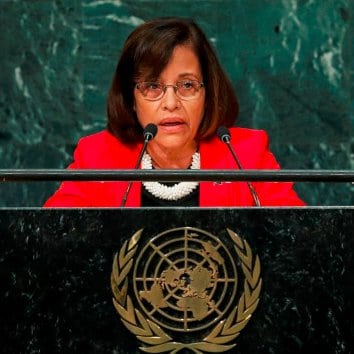 By a margin of one vote, President Hilda Heine of the Marshall Islands retained her job on Monday following a no-confidence vote initiated by the opposition, Nikkei Asian Review reports.
By a margin of one vote, President Hilda Heine of the Marshall Islands retained her job on Monday following a no-confidence vote initiated by the opposition, Nikkei Asian Review reports.
A tie of 16 for and 16 against deprived the opposition of the 17 votes it needed to oust Heine.
The South Pacific’s only female head-of-state is being challenged in part due to her governement’s creation of a national cryptocurrency for the islands.
The currency, called “the Sovereign” (SOV), was announced in February when the islands passed its Sovereign Currency Act of 2018.
The new laws provide the necessary legal framework to render the Sovereign (SOV), “legal tender of the Marshall Islands for all debts, public charges, taxes and dues.”
According to the SOV site:
“By virtue of being legal tender of the Marshall Islands, SOV is legally defined as money worldwide.”
David Paul, Minister-in-Assistance to the President & Environment Minister of the Marshall Islands, has stated that he believes the sovereign, “…will keep the Republic of the Marshall Islands and its residents integrated into the digital economy, allow residents to transfer and receive funds safely and instantaneously without the need for a correspondent banks, who have long threatened to stop servicing small Pacific island countries…and help the country make up for a sharp and imminent decline in external aid.”
He added that “care” is being taken to ensure, “that anti-money laundering mechanisms are embedded into the currency itself – a first for any currency.”
Yesterday, IMF managing director Christine Lagarde told an audience in Singapore that it should prepare itself for a cashless future populated by national cryptocurrencies.
But the IMF has criticized the Marshall Island’s SOV initiative, saying the nation is endangering its one remaining relationship with a US bank by issuing a cryptocurrency that could be abused by money launderers or terrorists.
The IMF has also called on the Marshall Islands to strengthen its AML/KYC standards generally and to make sure they cover offshore and maritime registries. “Directors also called for further steps to enhance the banking supervision framework,” in the Marshall Islands, says the IMF.
The SOV site says that it is a “decentralized” fiat currency with a limited supply and that 24 million SOVs will be minted at the outset. Total supply is not stated.
The site also states that, “The SOV money supply will grow by 4% annually following Milton Friedman’s k-percent rule,” and that Marshall Islands citizens will be “seeded” 10% of total coins at launch.
It is not clear from the site whether the SOV is designed to appreciate or will be traded speculatively on crypto exchanges, nor how much the government or involved individuals will retain.
If the SOV is tradable, in addition to functioning as legal tender, the SOV would have the qualities of a stock.
According to the Nikkei Asian Review (NAR), opposition members in the Marshall Islands accused the Heine administration of “tarnishing” the country’s reputation by creating the Sovereign.
They had proposed the region should rather orient itself towards becoming a tax and investing haven.
In the lead up to the vote, Heine accused China of interference.
China reportedly seeks control over the Rongelap atoll, and, “…has plans to turn (it)…into a special administrative zone that would include a tax-free port and offshore company registration,” writes NAR.
Castem Nemra, who was briefly president in 2016 before himself being deposed in a non-confidence vote, has accused the Marshallese government of, “…fail(ing) to investigate the loss of $1 billion from the Marshall Islands Trust Fund, set up by the U.S. to compensate Marshallese affected by the nuclear tests.”
Other government conduct was also questioned during arguments about the referendum, including, “government shipping services, voting procedures and actions of senators in the assembly.”
The idea to create a MMarshallese cryptocurrencyreportedly came from an Isreali startup Neema, which was seeking a nation without its own currency. The US dollar is used in the Marshall Islands now.
Neema reportedly told the Marshallese government that it could make $30 million dollars by issuing the SOV, another claim that suggests the currency may be speculatively traded in the future.
No SOV’s have yet been issued, and the Marshall Islands is said to be, “…waiting to meet requirements from the International Monetary Fund, the U.S. and Europe,” before it does so.

